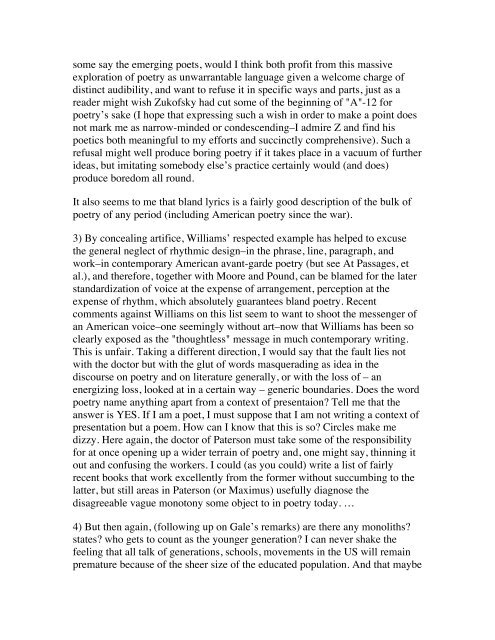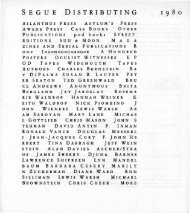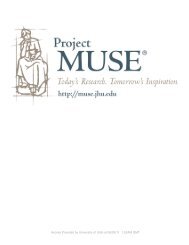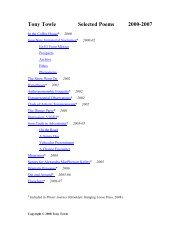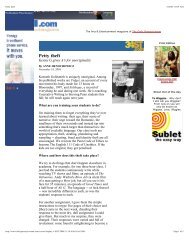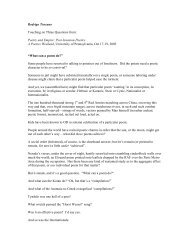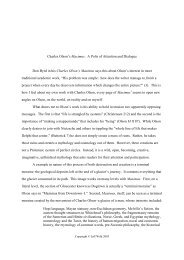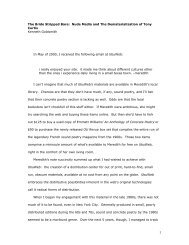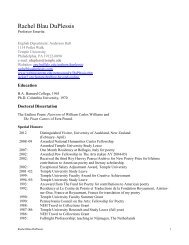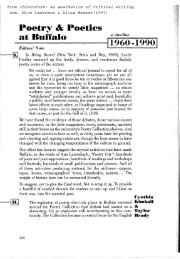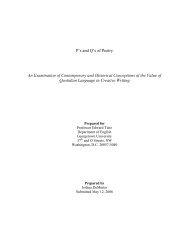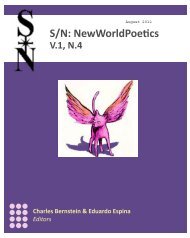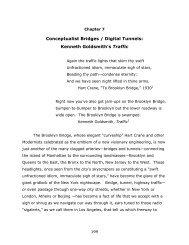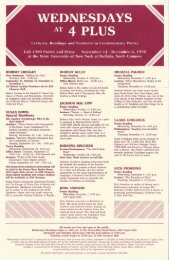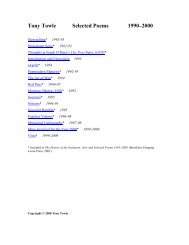Preface - Electronic Poetry Center
Preface - Electronic Poetry Center
Preface - Electronic Poetry Center
Create successful ePaper yourself
Turn your PDF publications into a flip-book with our unique Google optimized e-Paper software.
some say the emerging poets, would I think both profit from this massive<br />
exploration of poetry as unwarrantable language given a welcome charge of<br />
distinct audibility, and want to refuse it in specific ways and parts, just as a<br />
reader might wish Zukofsky had cut some of the beginning of "A"-12 for<br />
poetry’s sake (I hope that expressing such a wish in order to make a point does<br />
not mark me as narrow-minded or condescending–I admire Z and find his<br />
poetics both meaningful to my efforts and succinctly comprehensive). Such a<br />
refusal might well produce boring poetry if it takes place in a vacuum of further<br />
ideas, but imitating somebody else’s practice certainly would (and does)<br />
produce boredom all round.<br />
It also seems to me that bland lyrics is a fairly good description of the bulk of<br />
poetry of any period (including American poetry since the war).<br />
3) By concealing artifice, Williams’ respected example has helped to excuse<br />
the general neglect of rhythmic design–in the phrase, line, paragraph, and<br />
work–in contemporary American avant-garde poetry (but see At Passages, et<br />
al.), and therefore, together with Moore and Pound, can be blamed for the later<br />
standardization of voice at the expense of arrangement, perception at the<br />
expense of rhythm, which absolutely guarantees bland poetry. Recent<br />
comments against Williams on this list seem to want to shoot the messenger of<br />
an American voice–one seemingly without art–now that Williams has been so<br />
clearly exposed as the "thoughtless" message in much contemporary writing.<br />
This is unfair. Taking a different direction, I would say that the fault lies not<br />
with the doctor but with the glut of words masquerading as idea in the<br />
discourse on poetry and on literature generally, or with the loss of – an<br />
energizing loss, looked at in a certain way – generic boundaries. Does the word<br />
poetry name anything apart from a context of presentaion? Tell me that the<br />
answer is YES. If I am a poet, I must suppose that I am not writing a context of<br />
presentation but a poem. How can I know that this is so? Circles make me<br />
dizzy. Here again, the doctor of Paterson must take some of the responsibility<br />
for at once opening up a wider terrain of poetry and, one might say, thinning it<br />
out and confusing the workers. I could (as you could) write a list of fairly<br />
recent books that work excellently from the former without succumbing to the<br />
latter, but still areas in Paterson (or Maximus) usefully diagnose the<br />
disagreeable vague monotony some object to in poetry today. …<br />
4) But then again, (following up on Gale’s remarks) are there any monoliths?<br />
states? who gets to count as the younger generation? I can never shake the<br />
feeling that all talk of generations, schools, movements in the US will remain<br />
premature because of the sheer size of the educated population. And that maybe


